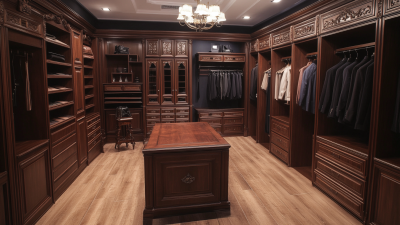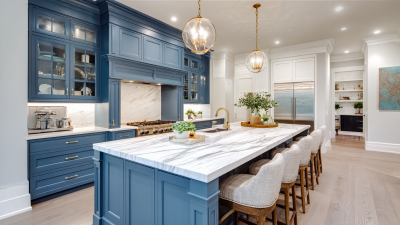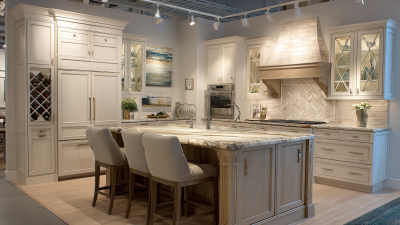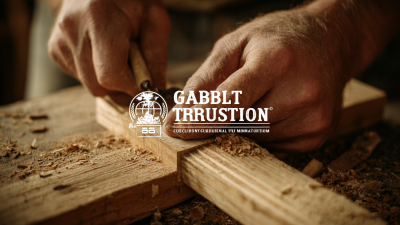Unique Home Closet Designs Transforming Storage Solutions with Data Driven Insights
In recent years, the concept of Home Closets has evolved significantly, driven by innovative designs and data-driven insights that cater to the growing demand for functional yet stylish storage solutions. According to a report by the National Kitchen and Bath Association, nearly 80% of homeowners consider organized closets a critical feature in their homes, highlighting the importance of efficient storage in today’s market. This trend reflects a broader cultural shift towards minimalism and organization, with many consumers actively seeking customized closet solutions that maximize space utilization. Additionally, data from the American Home Improvement Research Institute indicates that 63% of homeowners are willing to invest in specialty storage systems to enhance their home’s aesthetic and functionality. As we explore unique home closet designs, we will reveal practical tips and creative ideas that not only optimize storage but also transform the way we perceive and utilize our living spaces.

Innovative Closet Designs: Improving Space Utilization by 30% Through Smart Layouts
In today's world, where space is often at a premium, innovative closet designs have emerged as a game-changer for efficient storage solutions. By utilizing smart layouts that leverage data-driven insights, homeowners can significantly improve space utilization—often by as much as 30%. These cutting-edge designs consider the dimensions, styles, and specific needs of individual users, leading to more personalized and functional spaces.
 The core philosophy behind these innovative closet solutions is to analyze how people interact with their belongings. Utilizing technology, designers can implement strategic shelving, customized compartments, and versatile hanging options tailored to the user's lifestyle. This not only maximizes available storage but also simplifies organization, making it easier to access clothing and accessories. As a result, homeowners can enjoy a clutter-free environment that enhances both functionality and aesthetics in their living spaces.
The core philosophy behind these innovative closet solutions is to analyze how people interact with their belongings. Utilizing technology, designers can implement strategic shelving, customized compartments, and versatile hanging options tailored to the user's lifestyle. This not only maximizes available storage but also simplifies organization, making it easier to access clothing and accessories. As a result, homeowners can enjoy a clutter-free environment that enhances both functionality and aesthetics in their living spaces.
With a focus on efficiency and personalization, the future of closet design is becoming more streamlined and intuitive. These advancements not only optimize storage capacity but also elevate the overall experience of home organization, proving that great design paired with smart data can transform even the smallest of spaces into a haven of order and beauty.
The Impact of Custom Storage Solutions on Home Organization: Market Trends and Consumer Preferences
In today's fast-paced world, effective home organization has become a necessity rather than a luxury. Custom storage solutions are increasingly gaining popularity as homeowners seek to maximize their space while maintaining aesthetic appeal. Recent market trends highlight a shift towards personalized designs that cater not only to individual storage needs but also to specific lifestyles. For instance, busy families require efficient, multifunctional closets, while urban dwellers may prioritize compact, stylish storage options that minimize clutter.
Data-driven insights play a crucial role in shaping these consumer preferences. Companies are leveraging analytics to understand the changing demands of their customers, focusing on features like modular shelving, accessible pull-out drawers, and eco-friendly materials. This trend reflects a growing awareness of sustainability, with many consumers opting for designs that are both practical and environmentally conscious. As more people embrace the idea that organization enhances their quality of life, the market for unique home closet designs is likely to continue its upward trajectory, driven by innovation and a commitment to meeting diverse consumer needs.
Data-Driven Insights: Analyzing Closet System Efficiency to Maximize Residential Storage
In the quest for maximizing residential storage, data-driven insights are becoming indispensable. By analyzing closet system efficiency, homeowners can identify the most effective configurations and features that work best for their unique needs. For instance, data analysis can reveal the ideal height and width for shelving, optimal spacing for hangers, and even the most efficient use of drawer space. This level of customization ensures that every inch of storage is utilized, minimizing clutter and enhancing overall organization.
Moreover, when homeowners rely on data to inform their closet designs, they can make more informed decisions about materials and styles that align with their lifestyle. Insights gathered from user interactions with various closet designs can lead to innovative features such as adjustable shelving or built-in lighting, which not only improve functionality but also elevate the aesthetic appeal. As a result, unique home closet designs are evolving from mere storage spaces into personalized solutions that blend efficiency with style, making everyday living more seamless and enjoyable.

Sustainable Materials in Closet Design: Balancing Aesthetics and Eco-Friendliness with Consumer Demand
Sustainable materials are at the forefront of modern closet design, allowing homeowners to create beautiful spaces that are also eco-friendly. By choosing materials like reclaimed wood, bamboo, and recycled metals, designers can offer storage solutions that not only meet aesthetic demands but also significantly reduce environmental impact. Incorporating these materials helps in creating a closet that not only looks good but also promotes sustainability.
When embarking on a closet design project, consider these tips: first, opt for modular shelving systems made from sustainable resources, as they offer flexibility and can be adjusted over time to meet evolving needs. Second, pay attention to the finishing touches—select low-VOC paints or natural finishes to ensure air quality remains high. Finally, consider investing in energy-efficient lighting options that highlight your closet's design while being environmentally conscious.
By blending aesthetics with eco-friendliness, homeowners can achieve a stylish, organized storage solution that resonates with the growing consumer demand for sustainability. Leveraging data-driven insights during the design process can further enhance these choices, aligning them with contemporary trends and preferences.
Unique Home Closet Designs Transforming Storage Solutions with Data Driven Insights
| Design Type | Material Used | Sustainability Rating | Aesthetic Appeal (1-10) | Consumer Demand (%) | Storage Efficiency (%) |
|---|---|---|---|---|---|
| Walk-In Closet | Bamboo | High | 9 | 75 | 90 |
| Modular Closets | Recycled Wood | Medium | 8 | 70 | 85 |
| Sliding Door Closet | Sustainable MDF | High | 7 | 60 | 75 |
| Corner Closet | Bamboo | High | 8 | 65 | 80 |
| Built-In Closet | Eco-Friendly Laminates | Medium | 9 | 80 | 95 |
Harnessing Technology in Closet Solutions: The Rise of Smart Closets and Home Automation
In recent years, the concept of smart closets has emerged as a game-changer in home organization and storage solutions. Harnessing technology, these innovative spaces integrate data-driven insights to enhance efficiency and usability. With the advent of smart sensors, homeowners can now monitor their closet inventory, receive alerts for seasonal clothing swaps, or even find the perfect outfit based on weather predictions and personal schedules. This level of automation not only streamlines the dressing process but also encourages a more mindful approach to clothing management.
Moreover, advancements in home automation systems are transforming the traditional closet into a personalized haven. Imagine stepping into a closet where lighting adjusts automatically based on the time of day, or mirrors that display outfit suggestions and coordinate with an individual's calendar. Customizable shelving and hanging systems equipped with smart technology allow for tailored organization that adapts to changing user preferences and lifestyle demands. As technology continues to evolve, the integration of smart features into closet design reflects a broader trend towards creating functional, user-centric spaces that enhance everyday living.
Related Posts
-

Empowering Global Living Spaces with Premium Home Closets Made in China
-

2025 Trends: The $10 Billion Best Painted Kitchen Cabinets Market Growth
-

Ultimate Guide to 2023 Best Kitchen Bathroom Cabinets with 15 Key Features and Specifications
-

Unlocking the Advantages of Custom Home Cabinets for Modern Living Spaces
-

Unmatched Quality in Cabinet Construction Why Global Trust in Chinese Manufacturing Endures
-

7 Essential Features of Custom Cabinets That Elevate Your Home Design

